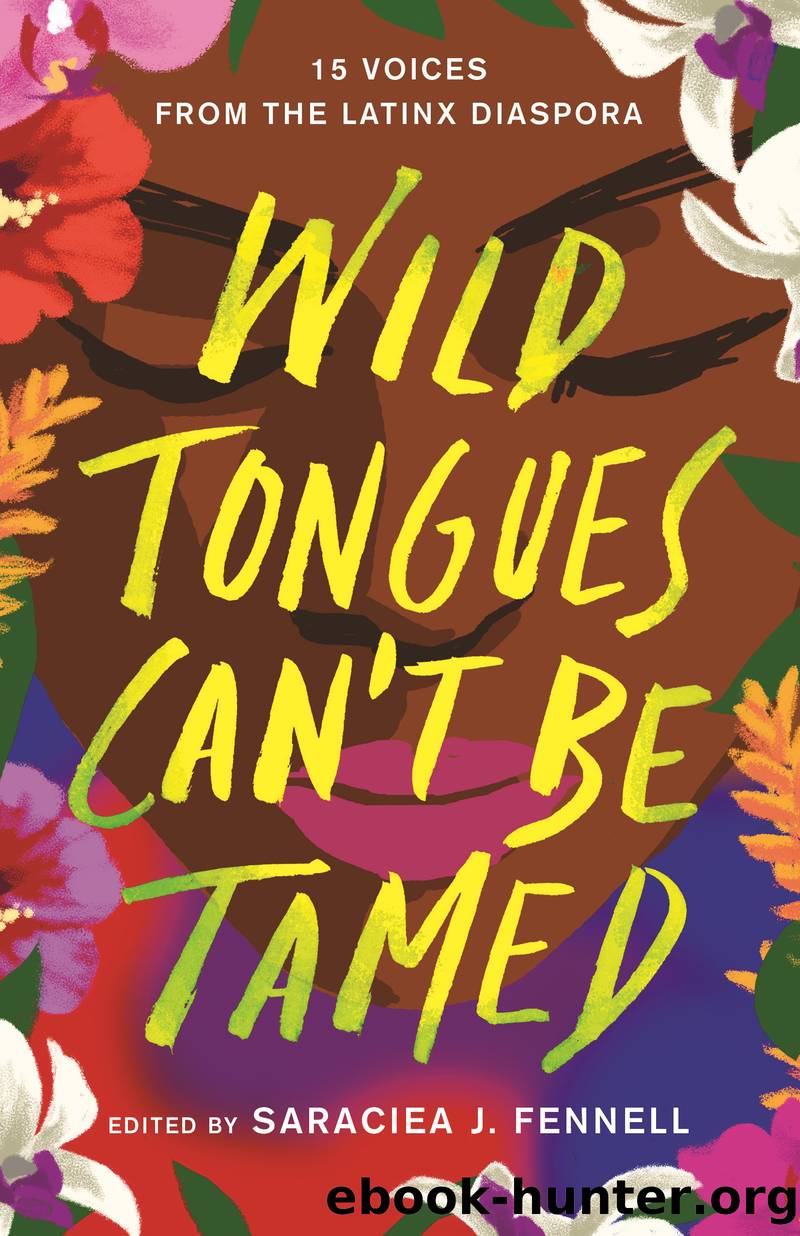Wild Tongues Can't Be Tamed by Saraciea J. Fennell

Author:Saraciea J. Fennell
Language: eng
Format: epub
Publisher: Flatiron Books
Cuban Impostor Syndrome
Zakiya N. Jamal
Growing up on Long Island, my high school was more diverse than others but still overwhelmingly white, so when a new guy in school mentioned he was Cuban, I couldnât help being excited.
âIâm Cuban too!â I said without hesitation.
Now, I can remember so clearly the look of skepticism on his face and in his voice when he said, âReally?â But back then, I either didnât notice or decided to brush it aside.
âYeah,â I told him. âMy grandmaâs from Cuba.â
âOkay.â
That was it. End of conversation. He turned away from me.
I hadnât been looking for someone who was Cuban or someone Iâd have something in common with, but when I found him, I thought it was really cool. For the briefest of moments, I considered telling him about the best Cuban restaurants in the area and asking him if he knew the same music Iâd always hear at family parties. I wanted to ask if he pronounced plantains the right way (itâs plan-tins, not plan-tains). I felt like there was so much for us to discuss, and yet he didnât feel that way at all. Instead, I was dismissed as if my being Cuban was unbelievable, which is almost laughable to me now.
The boy was white-passing. He had blond hair and pale skin and, like me, no one would have ever guessed by looking at him that he was Cuban. But while I didnât question his ethnicity because of his race, he didnât offer me the same courtesy. The dismissal made me feel like Iâd been given a Cuban test and failed.
At the time, my mind didnât automatically go to racism or colorism. Though my grandma is as dark as I am, the members of our family come in all shades, and some are even white-passing, like the boy in my school. Although we looked different, we were all treated the same. I was never made to feel less than or even teased because of what I looked like. We were all Cuban, and we were all equal.
Or at least I thought we were.
After that conversation with the boy in my school, my eyes were opened. I didnât have the words for it yet, but I knew it was my Blackness that cast doubt on my authenticity as a Cuban person. I knew that if one of my lighter-skinned cousins had met this boy, he probably wouldnât have dismissed them.
The realization was a slow unraveling in me that led to what I now refer to as my Cuban Impostor Syndrome. Similar to the way I would often feel like I couldnât call myself a writer because I wasnât published, I started to think I couldnât say I was Cuban because I didnât fit the mold of what a Cuban should be.
It started with my race, but then started to spiral. I began comparing myself to the other Latinx people around me. On my street, there were two other Latinx families. One I didnât know very well, but the other was close friends with my aunt and cousin whose home my mother and I later moved into.
Download
This site does not store any files on its server. We only index and link to content provided by other sites. Please contact the content providers to delete copyright contents if any and email us, we'll remove relevant links or contents immediately.
Asking the Right Questions: A Guide to Critical Thinking by M. Neil Browne & Stuart M. Keeley(5752)
Autoboyography by Christina Lauren(5225)
Eat That Frog! by Brian Tracy(4518)
Dialogue by Robert McKee(4385)
Sticky Fingers by Joe Hagan(4186)
Journeys Out of the Body by Robert Monroe(3610)
Annapurna by Maurice Herzog(3464)
Full Circle by Michael Palin(3443)
Schaum's Quick Guide to Writing Great Short Stories by Margaret Lucke(3369)
Elements of Style 2017 by Richard De A'Morelli(3338)
The Art of Dramatic Writing: Its Basis in the Creative Interpretation of Human Motives by Egri Lajos(3058)
Atlas Obscura by Joshua Foer(2950)
Why I Write by George Orwell(2944)
The Diviners by Libba Bray(2927)
The Fight by Norman Mailer(2924)
In Patagonia by Bruce Chatwin(2919)
The Mental Game of Writing: How to Overcome Obstacles, Stay Creative and Productive, and Free Your Mind for Success by James Scott Bell(2897)
Venice by Jan Morris(2568)
The Elements of Style by William Strunk and E. B. White(2469)
